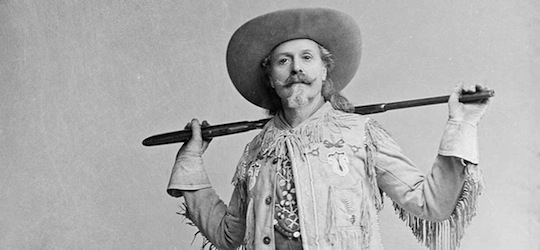Railroads played a vital role in the development of the American West. They not only brought supplies, settlers, and capital westward, but modernity as well. As a key participant in the creation and promotion of the myth of the Old West, William F. Cody recognized the important qualities railroads brought westward. His previous work as a hunter and supplier of buffalo meat for the Kansas Pacific Railroad and his Wild West show’s extensive use of rail lines brought him into close contact with railroad executives and other men of wealth and influence. When he decided to found the town of Cody, Wyoming, Bill Cody believed the connections he had forged as “Buffalo Bill” would serve him well as he navigated the bureaucratic and political structures involved in town development.
Monthly Archives: March 2012
“Saving and Enjoying the Vanishing Wild West: William F. Cody as a Preservationist and Sportsman,” Adam Hodge, University of Nebraska-Lincoln
William F. “Buffalo Bill” Cody earned his fame and nickname during the late 1860s when he slaughtered thousands of bison to feed Kansas Pacific Railroad construction workers. Consequently, many sportsmen and early game preservationists looked down upon him as a mere “skinner.” By the end of his life, however, Cody’s perspective on game animals had changed. A mere month before his death, for instance, Cody in December 1916 wrote a letter of introduction for one Irving H. “Larry” Larom, writing that, “He will explain how we men here in the big game country are trying to preserve the fast disapearing [sic] big game of the country.” Yet, Cody always remained an avid sportsman, routinely organizing and/or leading big game hunts in northwestern Wyoming for his friends and business partners living throughout the United States, as well as European dignitaries.
“Becoming Buffalo Bill: William F. Cody and the Transformative Effects of the 1862 Railroad and Homestead Acts on the Kansas Great Plains Experience,” Brent Rogers, University of Nebraska-Lincoln
William F. Cody’s early life—and his later celebrity based on it—took place largely within Kansas specifically and the Great Plains generally. Much of his earliest autobiography written in 1879 contains important historical content concerning the region’s growth and development. Though they do not appear explicitly in the autobiography, two landmark 1862 Congressional acts, especially the Pacific Railroad Act and the Homestead Act, set into motion and fundamentally shaped Cody’s Great Plains experience. Understanding the changing plains atmosphere as a result of the 1862 acts provides important context to Cody’s life at the time in which he became the legendary character of Buffalo Bill.
“The William F. Cody Archive,” Digital Poster Session, Jason A. Heppler, University of Nebraska-Lincoln
Our electronic poster submission will showcase the William F. Cody Digital Archive through which we will introduce viewers to various aspects of the project and discuss the historic and idealized impact that Cody had on the American West and Great Plains. The Archive offers an opportunity to view the historic developments and idealization of the American West through William F. “Buffalo Bill” Cody. Specifically, we will present materials and findings related to Native Americans and Rough Riders, two key groups of performers involved in his Wild West exhibitions.
